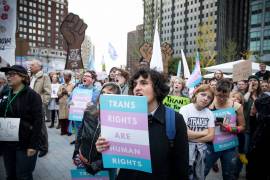
What Happened—or Didn’t Happen—at the Supreme Court Today
Blog Search
Contrary to many people’s expectations, the U.S. Supreme Court did not issue any orders last Friday or today in any of the four challenges to a provision of the so-called Defense of Marriage Act (DOMA), in the Hollingsworth v. Perry case challenging California’s Proposition 8, or in Brewer v. Diaz (Lambda Legal’s case that has preserved domestic partner health insurance coverage for families of lesbian and gay Arizona state employees). The next time we may hear from the Court about what it plans to do regarding these cases is this coming Friday, December 7.
Stand up against DOMA. Sign our pledge now!
The Court generally doesn’t explain the reason for delays in issuing orders. While some people are understandably feeling frustrated with the delays given all that is riding on these lawsuits, it should be recognized that the Court’s decisions about which case or cases to hear right now involve a good deal of complexity. The main issue in the DOMA challenges is the same: whether DOMA violates the Constitution's guarantee of equality for the federal government to discriminate against same-sex couples by treating them as single, while recognizing all other validly entered marriages. However, the particular federal programs involved in each case are somewhat different, and there are numerous procedural questions posed by the eight petitions for review that have been filed by the various parties in those suits.
Justice Kagan needs to decide whether to recuse herself from GLAD’s Gill v. OPM case. The ACLU’s Windsor v. United States case involves the additional wrinkle of how New York treats marriages entered in Canada. Lambda Legal’s Golinski v. OPM case, GLAD’s Pedersen v. OPM case, and Windsor, all came to the Supreme Court in an unusual way—with requests for review having been filed before decisions from the intermediate appellate courts were issued. And there have been questions raised about the right of various parties to ask for Supreme Court review because of who the party asking is or because that party won below.
The Supreme Court has to decide not only which challenge to DOMA to hear, but also whether to hear the Perry or Diaz cases now, or wait until after a DOMA case is decided. Although the questions in these two cases are different from the DOMA challenges, a decision in a DOMA case that laws that discriminate based on sexual orientation should be given heightened scrutiny by the courts and presumed unconstitutional could make the Perry and Diaz cases easier to decide, and the Court might choose to hold one or both of those cases for that reason. If Perry is to be considered now, the justices may direct the parties to brief only the narrow ground decided by the Ninth Circuit that involves the unusual circumstances of California’s marriage ban or broader grounds as well, in addition to the question of whether or not the proponents of Prop 8 have the right to appeal. In Diaz, the Court needs to consider whether to get involved at this point (wading in on whether a preliminary injunction was properly issued keeping insurance coverage in place while the case proceeds), when the case is not yet fully resolved at the trial court.
All of these questions about which case or cases to hear now will have significant implications for the outcomes. Thus, what might seem a simple decision is actually not so simple after all. And so we wait…




